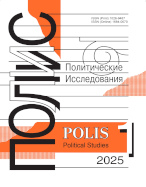Network political parties
Smorgunov L.V.,
Dr. Sci. (Philos.), Professor, Head of the Political Governance Department, Faculty of Political Science, St. Petersburg State University, St. Petersburg, Russia, l.smorgunov@spbu.ru
elibrary_id: 208776 | ORCID: 0000-0002-2581-2975 | RESEARCHER_ID: H-4986-2013
DOI: 10.17976/jpps/2014.04.03
Smorgunov L.V. Network political parties. – Polis. Political Studies. 2014. No. 4. https://doi.org/10.17976/jpps/2014.04.03
The article describes the transformation of the political parties, associated with changes in modern politics and political communication in the digital age. Analyzed are the impact of personalization, interactivity and direct participation on traditional political parties, which have been put before the challenges of reducing the party membership, the ineffectiveness of traditional organizational mobilization, critics of the political elites and representation. Using websites and access parties to social networking determines the trend of turning them into media communication parties with the formation of the extended party networks. Together with the transformation of the traditional political parties on the political scene there are new cyber parties that for a decade have become one of the prominent political forces. Analyzed are the main features of the cyber parties and demonstrates the level of their political influence. Proved is the idea of the network’s nature of cyber parties, revealed are their populist character and diversity of ideological aspirations.
See also:
Suvakovic U.,
Political parties as traditional mechanisms of representation in modern societies. – Polis. Political Studies. 2010. No2
Gelman V.Ya.,
Political Parties in Russia: from Competition – to Hierarchy. – Polis. Political Studies. 2008. No5
Glavachek P.,
Political parties and society in contemporary Belarus. – Polis. Political Studies. 2010. No2
Köchler H.,
The new social media: chance or challenge for dialogue?. – Polis. Political Studies. 2013. No4
Kashirskikh O.N.,
Political Parties of Germany in the Context of the Modernization of Political Communication. – Polis. Political Studies. 2009. No2





.jpg)






 print
print
.jpg)
.jpg)